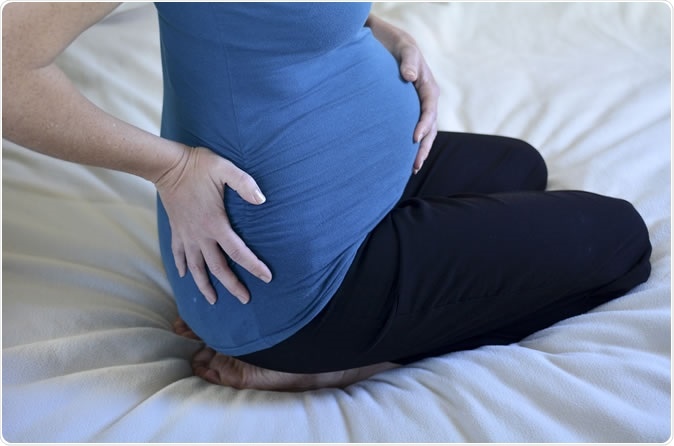
Pregnancy-related acute kidney injury (AKI) is a public health problem and is associated with significant maternal and fetal morbidity and mortality. Clinical outcomes in pregnancy-related AKI, especially in women with diabetes are not well studied. - Image Credit: ChameleonsEye / Shutterstock
To arrive at these conclusions, the researchers looked at records retrieved from the 2006-2015 Nationwide Inpatient Sample which has data on over 7 million separate hospitalization episodes every year in the US. They identified hospitalizations for pregnancy, AKI and diabetes mellitus in women aged 15-49 years.
Among these, there were about 15,550,459 pregnancy-related hospitalizations, of which 0.08% involved AKI. The rate showed a rising trend from 0.04% to 0.12% over the study period.
High-risk factors for AKI in pregnancy include not only diabetes but also older age and black origin. Women who developed AKI in pregnancy had an average age of 40 years, compared to 30 years for those who did not. The rate was highest in black women, at 0.25%, but 0.07% in white.
About 1.3% of pregnant women also had diabetes, and the rate of AKI was ten times higher at 1.2% in these women compared to the 0.1% rate in other pregnant women. The risk of pregnancy-linked AKI with diabetes increased from 0.36% to 1.2% over these years. Diabetes did not significantly change the death rate in pregnant women with kidney injury, which was at 3.2% compared to 2.5% for others. It did not change the rate of home discharge either which was over 75% in both cases.
Kidney injury in pregnancy was more common in southern and Midwestern USA, at 0.12%, and in urban teaching hospitals (at 0.14%), which registered higher rates than in rural and urban non-teaching hospitals with 0.07% and 0.04% respectively.
Acute kidney injury in pregnancy
The current study shows a rise in the rate of AKI in pregnancy, but there is wide variation in the rates in other countries. In India, for instance, AKI in pregnancy severe enough to require dialysis occurs at 10%, and accounts for 5% to 20% of all AKI in developing countries, while in the developed world, overall, it has come down to less than 1%.
The diagnosis is based on an increase in serum creatinine, due to abnormally low filtering of metabolic wastes by the kidneys. In pregnancy, the kidneys are called upon to filter a larger volume of urine, due to several changes that occur in the body. As a result, the serum creatinine levels are actually lower in pregnancy than they would be otherwise. Therefore, the level required to diagnose renal injury in pregnancy is lower than in the nonpregnant woman, falling within the otherwise normal range.
There are two high-risk periods in pregnancy related to AKI, the first occurring due to septic abortion, in the first trimester, and the second in late pregnancy or soon after childbirth, mostly due to placental or uterine bleeding caused by many conditions.
The use of standardized criteria to diagnose AKI in pregnancy shows that most pregnant patient with this condition have transient damage, with an almost 80% rate of discharge from hospital following treatment. Pregnancy –linked AKI may occur in women with comorbid conditions such as hypertension, diabetes, and chronic renal disease. There is a higher incidence of pre-eclampsia, the HELLP (Hemolysis, Elevated Liver function tests, Low Platelets) syndrome, and other conditions like conditions in which clotting is related to microvascular disease, such as thrombotic thrombocytopenic purpura (TTP).
Prerenal causes of pregnancy-linked AKI include massive bleeding, typically post-childbirth but often because of pre-labor placental separation or a low-lying placenta, septic abortion, acute fatty liver of pregnancy, puerperal sepsis and chorioamnionitis (infection of the uterine contents in pregnancy). Acute cortical necrosis can also occur where kidney damage is likely to be permanent and lead to renal failure. Some of these conditions such as kidney complications due to lupus, pyelonephritis and TTP are more commonly associated or severe with pregnancy. Kidney stones, or blockage of the ureters by an overly enlarged uterus as with some twin pregnancies or with excessive amniotic fluid, may cause kidney injury due to backing up of the urine flow, with increase in pressure within the kidney.
In most cases of prerenal injury the damage is minimized by stopping the bleeding when present, early and aggressive antibiotic treatment for infections, restoring the lost blood volume through intravenous fluids, treatment of complications, and using dialysis in a timely manner. The baby must be delivered in some situations.
Conclusion
The outcomes of the current research indicate an area of current concern in the care of pregnant women in the developed world. Some causes for the increasing numbers of pregnant women being hospitalized with AKI may be the rising age at first conception and the use of assisted reproductive technologies. Researcher Silvi Shah cautions, “The findings of our study may necessitate change in nationwide policies regarding obstetric care of women and emphasize the need for kidney health monitoring for women hospitalized during pregnancy and during their outpatient prenatal visits.”
Source:
Journal reference:
Pregnancy-related AKI and diabetes: hospitalizations and clinical outcomes. Silvi Shah, Karthikeyan Meganathan, Anthony Leonard, Annette Christianson, and Charuhas V. Thakar. ASN Kidney Week. https://www.asn-online.org/education/kidneyweek/2019/program-abstract.aspx